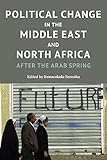Political Change in the Middle East and North Africa : After the Arab Spring / Inmaculada Szmolka.
Material type: TextPublisher: Edinburgh : Edinburgh University Press, [2022]Copyright date: ©2017Description: 1 online resource (456 p.) : 10 B/W illustrations 29 B/W tables tables, figures, maps and imagesContent type:
TextPublisher: Edinburgh : Edinburgh University Press, [2022]Copyright date: ©2017Description: 1 online resource (456 p.) : 10 B/W illustrations 29 B/W tables tables, figures, maps and imagesContent type: - 9781474415286
- 9781474415293
- 320.956 23
- online - DeGruyter
| Item type | Current library | Call number | URL | Status | Notes | Barcode | |
|---|---|---|---|---|---|---|---|
 eBook
eBook
|
Biblioteca "Angelicum" Pont. Univ. S.Tommaso d'Aquino Nuvola online | online - DeGruyter (Browse shelf(Opens below)) | Online access | Not for loan (Accesso limitato) | Accesso per gli utenti autorizzati / Access for authorized users | (dgr)9781474415293 |
Frontmatter -- Contents -- Figures and Tables -- The Contributors -- Acknowledgements -- Introduction -- Part I -- Chapter 1 Analytical framework for a comparative study of change in political regimes -- Chapter 2 The Arab Spring changes under the prism of international relations theory -- Part II -- Chapter 3 Parties and party system change -- Chapter 4 Elections and electoral integrity -- Chapter 5 Constitutional reform processes -- Chapter 6 Government and power relations -- Chapter 7 Good governance in MENA countries -- Chapter 8 Civil society and social movements -- Chapter 9 Public rights and liberties -- Chapter 10 Media and media freedom -- Part III -- Chapter 11 Regional order and regional powers in the Middle East and North Africa -- Chapter 12 The political and security repercussions of Islamic State in the MENA region -- Chapter 13 EU and EU member states’ responses to the Arab Spring' -- Chapter 14 The foreign policy of the United States following the Arab Spring -- Part IV -- Chapter 15 Successful and failed transitions to democracy -- Chapter 16 Political liberalisation processes -- Chapter 17 Autocratisation, authoritarian progressions and fragmented states -- Appendix -- Index
restricted access online access with authorization star
http://purl.org/coar/access_right/c_16ec
Analyses the democratic dimension of the recent political changes in MENATaking a comparative approach, this book considers the ways in which political regimes have changed since the Arab Spring. It addresses a series of questions about political change in the context of the revolutions, upheavals and protests that have taken place in North Africa and the Arab Middle East since December 2010, and looks at the various processes have been underway in the region: democratisation (Tunisia), failed democratic transitions (Egypt, Libya and Yemen), political liberalisation (Morocco) and increased authoritarianism (Bahrain, Kuwait, Syria). In other countries, in contrast to these changes, the authoritarian regimes remain intact (Saudi Arabia, Qatar, Arab United Emirates. Key FeaturesUses a comparative theoretical and methodological approach to analyse and explain the consequences of the political changes within political regimes at a country, regional and international levelDevelops an overview of the consequences of the Arab Spring for the political regimes in the region and for the wider worldTakes a thematic approach, with chapters on parties and political groups, elections, constitutional frameworks, governance, civil society, rights and freedoms, regional powers, security issues, foreign policy, and media and media freedomLooks at EU and US foreign policy in the MENA regionCountries covered: Algeria, Bahrain, Egypt, Iraq, Jordan, Kuwait, Libya, Morocco, Oman, Syria, Tunisia, Yemen
Mode of access: Internet via World Wide Web.
In English.
Description based on online resource; title from PDF title page (publisher's Web site, viewed 29. Jun 2022)


